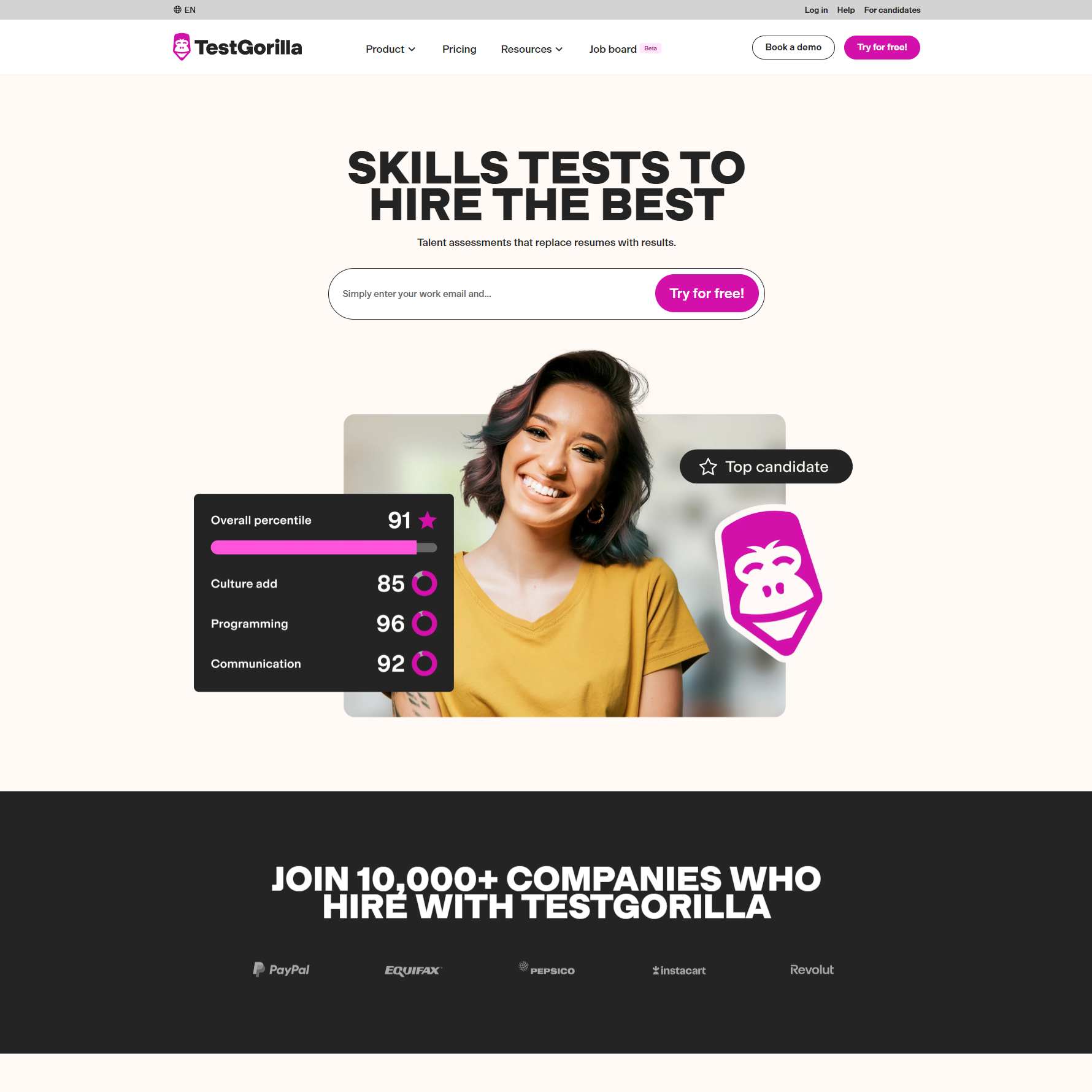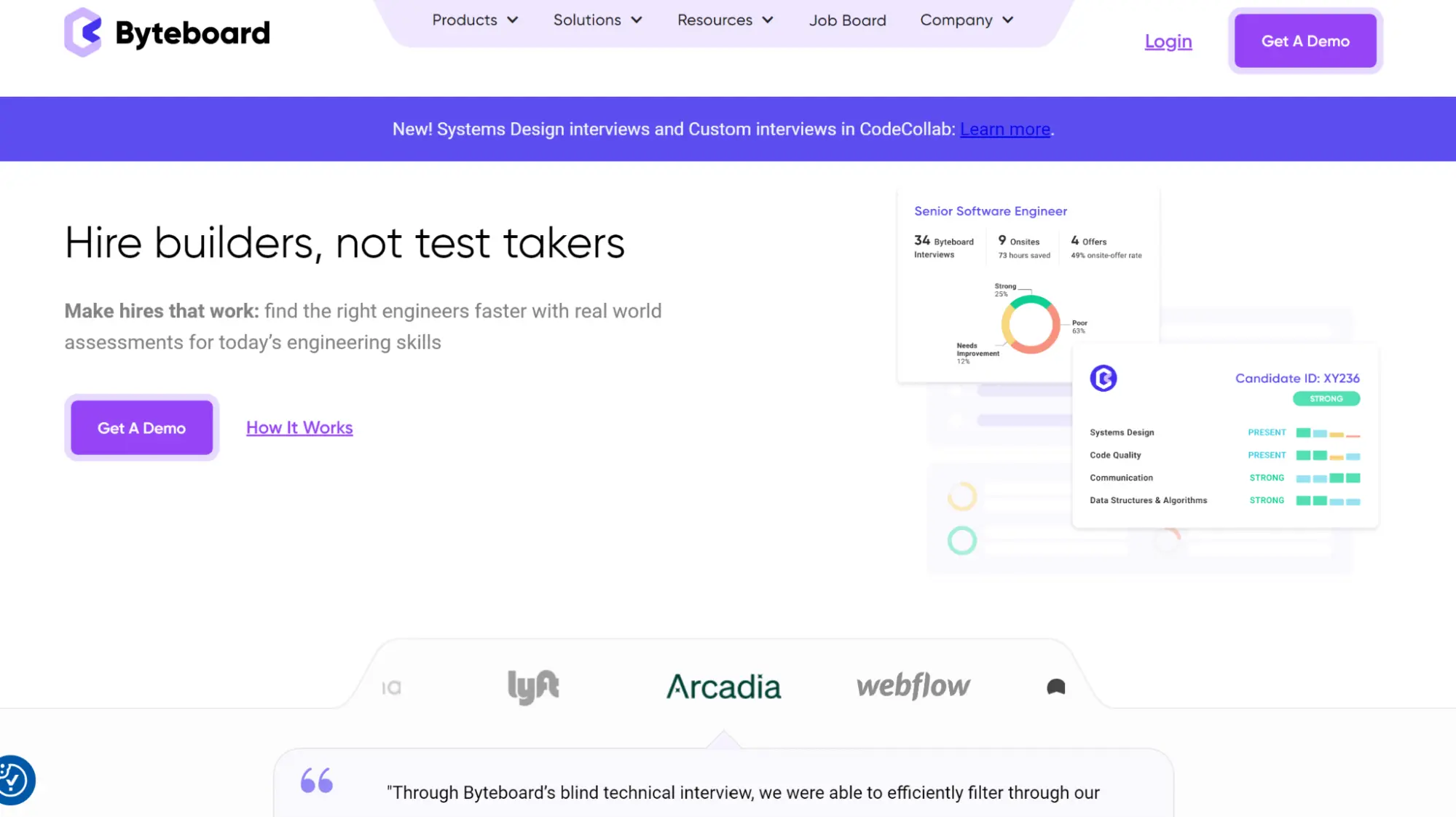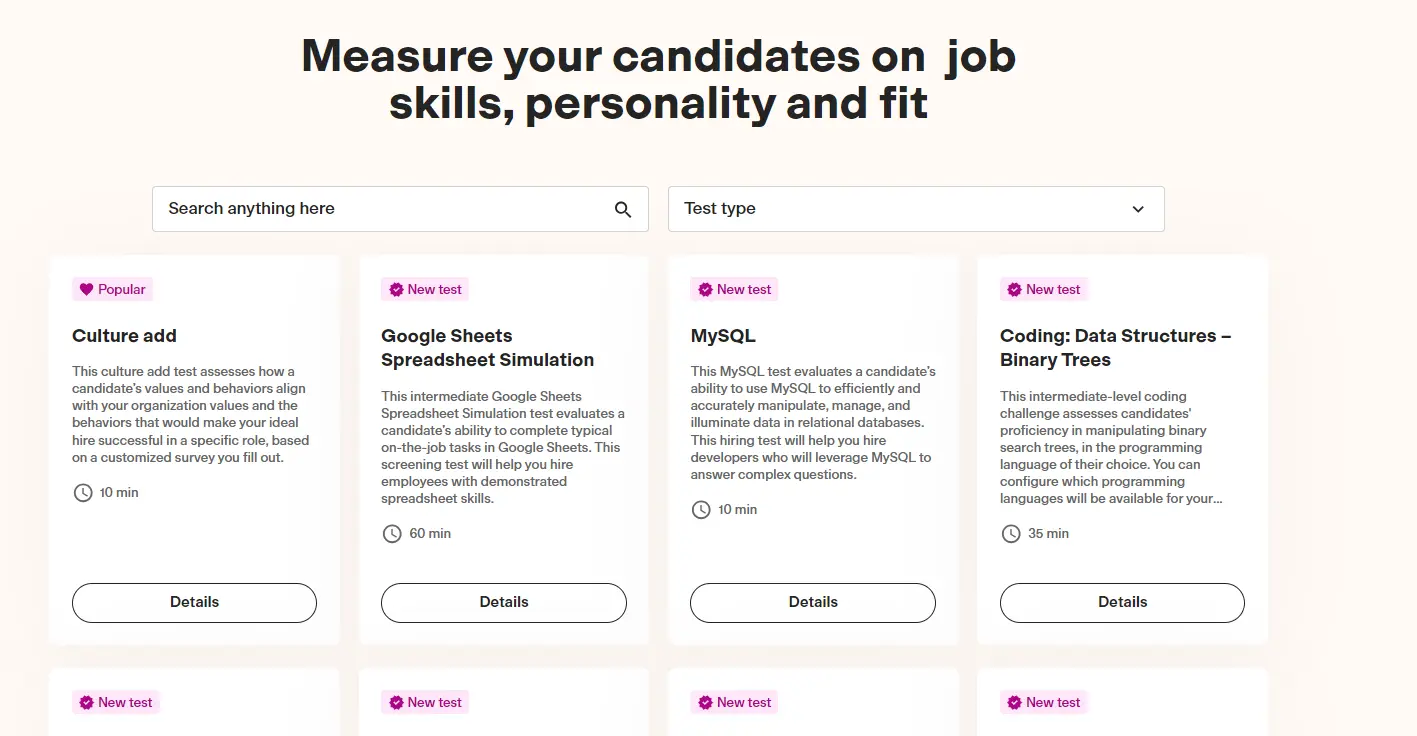Don’t leave hiring the best talent to chance
Pre-employment testing is an easier, faster, and more accurate way to identify top talent than traditional resume screening.
Hiring managers can accurately evaluate candidates based on job-specific skills and personality traits rather than relying on subjective information on resumes. This eliminates unconscious bias and leads to better, more data-driven decisions.
Using the right pre-employment screening provider is essential to finding the perfect hire. To help you choose the right option, this guide compares two popular testing platforms: TestGorilla and Byteboard.
Table of contents
How does TestGorilla work?
TestGorilla is a pre-employment testing service that offers 400+ ready-to-use tests. You can create assessments that precisely assess the skills and qualities required for a job role.
You can combine up to five existing tests, add custom questions, and conduct one-way video interviews. Assessment results are generated through automated scoring, which eliminates the effects of human bias and error.
TestGorilla enables you to customize invitations, assessments, and results with your company logo and brand colors. You can also add an intro or outro video to each assessment.
In addition, TestGorilla has strict anti-cheating measures in place to ensure results are accurate and reliable.
How does Byteboard work?
Byteboard is a pre-employment testing platform focused on software engineering skills. Its aim is to cut the time-to-hire in technical recruitment by making the process more job-focused rather than theoretical.
Byteboard requires candidates to finish a time-boxed project in which they can demonstrate their productivity and code clarity, as well as skills in systems reasoning, technical communication, and reading code.
Byteboard keeps test-taker information anonymous to keep the process fair and transparent. However, there’s no information available regarding Byteboard’s anti-cheating procedures.
The best insights on HR and recruitment, delivered to your inbox.
Biweekly updates. No spam. Unsubscribe any time.
TestGorilla vs. Byteboard: Test libraries
A great testing platform will have an extensive library with a range of tests for job-specific and general skills, personality traits, and cognitive abilities.
TestGorilla’s test library
TestGorilla’s test library consists of 400+ tests that are created using a rigorous, 28-step quality-control process.
Our tests evaluate:
Programming skills
Software skills
Job-specific skills
Situational judgment
We routinely update our library with new tests to evaluate in-demand skills. For example, we now offer a test for Working with Generative AI.
We support answer formats such as multiple-choice, video, audio, essay, and file upload. There are also coding challenges you can use to assess candidates for developer roles.
TestGorilla also has websites localized in 12 different languages – perfect for international and remote hiring needs.
Explore advanced skills testing with TestGorilla
See how TestGorilla leads the way in skills assessments. Sign up for our free live demo and discover a better way to evaluate candidates.
Byteboard’s test library
Byteboard’s test library consists of a single evaluation called CoreEval that asks employees to complete a small coding project. It consists of two components: a Technical Reasoning Exercise and a Code Implementation Exercise.
In the Technical Reasoning Exercise, test-takers are required to fix an existing code base with a new set of requirements by creating a design document.
The Code Implementation Exercise requires candidates to take solutions from the design document and implement them in a code database.
Byteboard doesn’t have tests for other job roles or skills. There are also no tests for cognitive ability, situational judgment, or personality.
Test libraries: Comparison chart at a glance
TestGorilla | Byteboard | |
Cognitive ability tests | Yes | No |
Situational judgment tests | Yes | No |
Job-specific tests | Yes | Yes (only for software engineering) |
Software tests | Yes | Yes |
Programming tests (including coding challenges) | Yes | Yes |
Language tests | Yes | No |
Personality test | Yes | No |
Culture-add test | Yes | No |
Motivation test | Yes | No |
Typing test | Yes | No |
Your own custom tests | Yes | No |
Custom questions per assessment | Yes | No |
Test recommendations for each job role | Yes | No |
Multiple tests per assessment | Yes | No |
TestGorilla vs. Byteboard: Functionalities for hiring developers
TestGorilla has individual tests for different skills for developer roles. Byteboard, meanwhile, uses a project-based evaluation process that doesn’t test different skills separately.
Hiring developers with TestGorilla
Beyond tests that assess the soft skills developers need, TestGorilla offers more than 120 programming and development tests that evaluate coding language proficiency, candidates' ability to use web- and mobile-development frameworks, and skills such as debugging and deployment.
We have tests for coding languages such as Python, Java, JavaScript, C++, and Ruby. We also have tests for web-development frameworks like Django, and mobile-development frameworks like Swift and Kotlin.
There are also custom coding and algorithmic-thinking challenges to test unique situations. A language-agnostic coding skills test enables developer candidates to choose from up to 20 different programming languages to solve coding challenges.
And with our configurable integrated development environment (IDE), candidates can personalize their environment to suit their preferences. For instance, they can choose the font size, color scheme, and more.
Our coding timeline enables you to analyze candidates’ processes in greater depth after they complete these challenges. You can even see if they pasted code – which might indicate cheating.
Other anti-cheating measures include webcam snapshots (with candidates’ permission), full-screen mode detection (to alert you if candidates leave full-screen mode, which might indicate they’re leaving the screen to research answers), and more.
Why TestGorilla excels in candidate screening
Find out what sets TestGorilla apart in hiring. Sign up for our free plan and access comprehensive tools for effective candidate screening.
Hiring developers with Byteboard
Byteboard’s tests can assess developers across different disciplines, including:
Software engineering
Front-end engineering
Mobile engineering
Data engineering
Site reliability engineering
Data analytics
Security engineering
Developers are given a single assignment that serves as their assessment. It’s unclear whether any anti-cheating measures are in place to maintain the integrity of the process.
Byteboard also supports live coding interviews with a tool called CodeCollab. Candidates and interviewers can code simultaneously, simulating what it’s like for applicants to work on a coding project with your team. This tool supports a configurable environment for candidates.
Functionalities for hiring developers: Comparison chart at a glance
TestGorilla | Byteboard | |
Coding languages | JavaScript, Java, Python, PHP, C, C#, C++, SQL, Kotlin, Ruby, TypeScript, Go, R, Scala, Swift, Julia, Elixir, Dart, Perl, Rust, and Erlang | Java, C#, C++, Python, Ruby, Java, JavaScript, Swift, Kotlin, HTML, Golang, PHP, Rust, Kotlin, and TypeScript |
Web-development frameworks | Yes | Yes |
Mobile-development frameworks | Yes | Yes |
Algorithmic-thinking challenges | Yes | No |
Debugging challenges | Yes | No |
Language-specific concept challenges | Yes | Yes |
Your own custom coding challenges | Yes | No |
Code-playback function | Yes | No |
Automated scoring | Yes | No |
TestGorilla vs. Byteboard: Pricing
Pre-employment testing services should offer flexible packages that suit both startups and enterprises and can easily scale as hiring needs rise.
TestGorilla’s pricing
TestGorilla offers three pricing plans that cater to businesses of all sizes:
Free forever at $0: Full access to five free tests and the ability to add five custom questions per assessment
Starter from $75 per month: Full access to the TestGorilla library and the ability to offer unlimited assessments
Pro from $115 per month: Everything in the Starter plan, plus integrations for applicant tracking system (ATS) platforms, custom branding on your tests, and the ability to add one-way interview questions to your tests
Pricing for the Starter and Pro plans scales based on how many full-time equivalent employees (FTEs) your business has. As an example, two part-time employees are equivalent to one FTE if they each work 20 hours weekly.
For a company with up to 15 FTEs, the Starter plan costs $75 per month and the Pro plan costs $115 per month. To give an example of how pricing scales with company size, a company with 50 FTEs will pay $208 per month for the Starter plan, while it will pay $310 per month for the Pro plan.
Companies with 15 or fewer FTEs must pay annually. Larger companies can choose between monthly or annual pricing.
Some companies are eligible for 15-day free trials. All plans enable you to test unlimited candidates.
Byteboard’s pricing
Byteboard offers three pricing options:
CodeCollab at $15 per unit per month: Get access to collaborative live coding
CoreEval at $300 per take-home interview (assessment) per month: Get full access to Byteboard’s assessment platform and pay for each candidate you assess
Enterprise by quote only: Customizable pricing for large-scale hiring efforts
Unfortunately, the pricing information on Byteboard’s website is somewhat confusing. For instance, it’s unclear if the CodeCollab plan costs $15 per month to evaluate a single candidate or to evaluate unlimited candidates. Either way, there’s a 14-day free trial of the CodeCollab plan.
And the CoreEval plan – which includes the project-based assessment – is rather pricey in comparison to competitors.
Pricing: Comparison chart at a glance
TestGorilla |
| Byteboard | |
Plan | Price | Plan | Price |
Free | $0 | CodeCollab | $15 per unit per month |
Starter | From $75 USD per month ($900 per year, paid upfront, for teams of 1-15 FTEs) | CoreEval | $300 per assessment per month |
Pro | From $115 USD per month ($1,380 per year, paid upfront, for teams of 1-15 FTEs) | Enterprise | By quote only |
Conclusion: TestGorilla vs. Byteboard
TestGorilla and Byteboard both aim to provide a better way to identify top talent, but they take different approaches to pre-employment testing.
TestGorilla has an extensive library of tests to assess various job-specific skills, aptitudes, and personality traits. You can also add custom questions, coding challenges, and one-way video interviews to assessments.
In contrast, Byteboard is limited to technical recruitment and lacks dedicated tests for measuring soft skills, personality, or cultural add. Users also can’t customize or create their own assessments.
Overall, TestGorilla excels thanks to its vast test library and its automated scoring process that ensures reliable, consistent, and fair results. Plus, it’s an affordable solution for businesses of all sizes.
Streamline your hiring process with pre-employment testing
Pre-employment testing helps companies save time and money with an efficient, simplified process. It helps hiring managers pick the perfect people for their open roles, increasing job satisfaction and employee retention – a win-win.
Want more information on how skills-based hiring can work for your company? Sign up for a free 45-minute live demo to discover how you can hire faster and better with TestGorilla! Or, if you’re ready to start using the platform now, sign up for a free plan.
You've scrolled this far
Why not try TestGorilla for free, and see what happens when you put skills first.






















